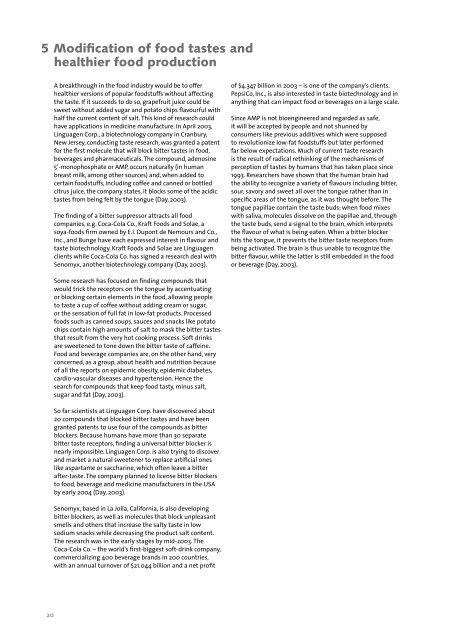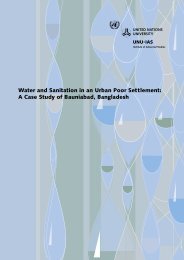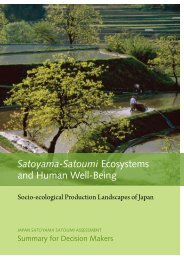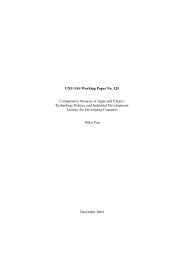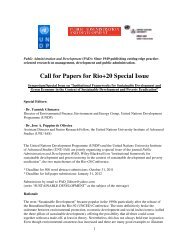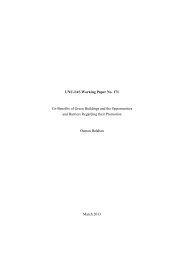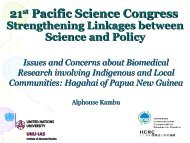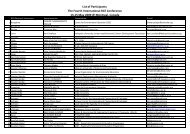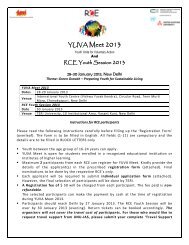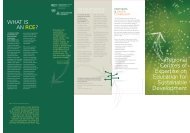Food and Nutrition Biotechnology - UNU-IAS - United Nations ...
Food and Nutrition Biotechnology - UNU-IAS - United Nations ...
Food and Nutrition Biotechnology - UNU-IAS - United Nations ...
You also want an ePaper? Increase the reach of your titles
YUMPU automatically turns print PDFs into web optimized ePapers that Google loves.
5 Modification of food tastes <strong>and</strong><br />
healthier food production<br />
20<br />
A breakthrough in the food industry would be to offer<br />
healthier versions of popular foodstuffs without affecting<br />
the taste. If it succeeds to do so, grapefruit juice could be<br />
sweet without added sugar <strong>and</strong> potato chips flavourful with<br />
half the current content of salt. This kind of research could<br />
have applications in medicine manufacture. In April 2003,<br />
Linguagen Corp., a biotechnology company in Cranbury,<br />
New Jersey, conducting taste research, was granted a patent<br />
for the first molecule that will block bitter tastes in food,<br />
beverages <strong>and</strong> pharmaceuticals. The compound, adenosine<br />
5’-monophosphate or AMP, occurs naturally (in human<br />
breast milk, among other sources) <strong>and</strong>, when added to<br />
certain foodstuffs, including coffee <strong>and</strong> canned or bottled<br />
citrus juice, the company states, it blocks some of the acidic<br />
tastes from being felt by the tongue (Day, 2003).<br />
The finding of a bitter suppressor attracts all food<br />
companies, e.g. Coca-Cola Co., Kraft <strong>Food</strong>s <strong>and</strong> Solae, a<br />
soya-foods firm owned by E.I. Dupont de Nemours <strong>and</strong> Co.,<br />
Inc., <strong>and</strong> Bunge have each expressed interest in flavour <strong>and</strong><br />
taste biotechnology. Kraft <strong>Food</strong>s <strong>and</strong> Solae are Linguagen<br />
clients while Coca-Cola Co. has signed a research deal with<br />
Senomyx, another biotechnology company (Day, 2003).<br />
Some research has focused on finding compounds that<br />
would trick the receptors on the tongue by accentuating<br />
or blocking certain elements in the food, allowing people<br />
to taste a cup of coffee without adding cream or sugar,<br />
or the sensation of full fat in low-fat products. Processed<br />
foods such as canned soups, sauces <strong>and</strong> snacks like potato<br />
chips contain high amounts of salt to mask the bitter tastes<br />
that result from the very hot cooking process. Soft drinks<br />
are sweetened to tone down the bitter taste of caffeine.<br />
<strong>Food</strong> <strong>and</strong> beverage companies are, on the other h<strong>and</strong>, very<br />
concerned, as a group, about health <strong>and</strong> nutrition because<br />
of all the reports on epidemic obesity, epidemic diabetes,<br />
cardio-vascular diseases <strong>and</strong> hypertension. Hence the<br />
search for compounds that keep food tasty, minus salt,<br />
sugar <strong>and</strong> fat (Day, 2003).<br />
So far scientists at Linguagen Corp. have discovered about<br />
20 compounds that blocked bitter tastes <strong>and</strong> have been<br />
granted patents to use four of the compounds as bitter<br />
blockers. Because humans have more than 30 separate<br />
bitter taste receptors, finding a universal bitter blocker is<br />
nearly impossible. Linguagen Corp. is also trying to discover<br />
<strong>and</strong> market a natural sweetener to replace artificial ones<br />
like aspartame or saccharine, which often leave a bitter<br />
after-taste. The company planned to license bitter blockers<br />
to food, beverage <strong>and</strong> medicine manufacturers in the USA<br />
by early 2004 (Day, 2003).<br />
Senomyx, based in La Jolla, California, is also developing<br />
bitter blockers, as well as molecules that block unpleasant<br />
smells <strong>and</strong> others that increase the salty taste in low<br />
sodium snacks while decreasing the product salt content.<br />
The research was in the early stages by mid-2003. The<br />
Coca-Cola Co. – the world’s first-biggest soft-drink company,<br />
commercializing 400 beverage br<strong>and</strong>s in 200 countries,<br />
with an annual turnover of $21.044 billion <strong>and</strong> a net profit<br />
of $4.347 billion in 2003 – is one of the company’s clients.<br />
PepsiCo, Inc., is also interested in taste biotechnology <strong>and</strong> in<br />
anything that can impact food or beverages on a large scale.<br />
Since AMP is not bioengineered <strong>and</strong> regarded as safe,<br />
it will be accepted by people <strong>and</strong> not shunned by<br />
consumers like previous additives which were supposed<br />
to revolutionize low-fat foodstuffs but later performed<br />
far below expectations. Much of current taste research<br />
is the result of radical rethinking of the mechanisms of<br />
perception of tastes by humans that has taken place since<br />
1993. Researchers have shown that the human brain had<br />
the ability to recognize a variety of flavours including bitter,<br />
sour, savory <strong>and</strong> sweet all over the tongue rather than in<br />
specific areas of the tongue, as it was thought before. The<br />
tongue papillae contain the taste buds; when food mixes<br />
with saliva, molecules dissolve on the papillae <strong>and</strong>, through<br />
the taste buds, send a signal to the brain, which interprets<br />
the flavour of what is being eaten. When a bitter blocker<br />
hits the tongue, it prevents the bitter taste receptors from<br />
being activated. The brain is thus unable to recognize the<br />
bitter flavour, while the latter is still embedded in the food<br />
or beverage (Day, 2003).


